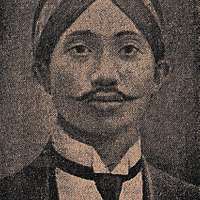 |
| Foto google |
Tjokroaminoto was the second child of 12 siblings, born to his father R.M. Tjokroamiseno, who was a government official at the time. His grandfather, R.M. Adipati Tjokronegoro, had also served as the regent of Ponorogo.
As a prominent figure in the movement, Tjokroaminoto played a crucial role in organizing and mobilizing the masses. In May 1912, he founded the Sarekat Islam organization, formerly known as the Serikat Dagang Islam. Tjokroaminoto was elected as its chairman. Sarekat Islam became one of the largest organizations of its time, with members from various sectors of society, such as traders, farmers, and workers.
In addition to being a leader of the organization, Tjokroaminoto was also known as a teacher. Many prominent Indonesian leaders of the time learned from him. His house served as a temporary residence (boarding house) for leaders who sought knowledge from him. Among his famous students were Semaoen, Alimin, Muso, Soekarno, Kartosuwiryo, and even Tan Malaka had studied under him.
Tjokroaminoto inspired his students to continue the struggle for the national movement. The ideas that emerged from his thinking gave rise to various ideologies in Indonesia at that time. For example, Semaoen, Muso, and Alimin adopted socialist/communist ideas, while Soekarno embraced nationalist ideas, and Kartosuwiryo combined Islamic principles with the national movement. However, these differing views caused tension among Tjokroaminoto's students.
During that time, political power had a strong influence, leading to former allies turning against each other. This was evident in the Madiun Rebellion of 1948, carried out by the Indonesian Communist Party (PKI), which proclaimed the "Indonesian Soviet Republic" under the leadership of Muso. President Soekarno then sent elite forces from the Indonesian National Army (TNI), known as the Siliwangi Division, to suppress the rebellion. In this incident, Muso, the leader of the Communist Party at that time, was shot dead on October 31. Subsequently, there was a rebellion by the Indonesian Islamic State (NII) led by Kartosuwiryo. Finally, Soekarno imposed the death penalty on Kartosuwiryo on September 12, 1962.
Tjokroaminoto left a strong legacy in the Indonesian national movement. One of his famous trilogies of thought was "Setinggi-tinggi ilmu, semurni-murni tauhid, sepintar-pintar siasat" (As high as knowledge, as pure as monotheism, as smart as strategy). This thinking reflected the atmosphere of Indonesia's struggle at that time, which required three essential abilities in a freedom fighter. Tjokroaminoto also played a significant role in shaping future leaders. He greatly admired Soekarno and even married his daughter, Siti Oetari, to Soekarno, who later became his first wife.
Furthermore, Tjokroaminoto imparted valuable messages to his students. He said, "If you want to become a great leader, write like a journalist and speak like an orator." This message influenced his students and led Soekarno to practice speeches every night, sometimes disturbing his awakened and laughing friends. Tjokroaminoto's students, such as Muso, Alimin, Kartosuwiryo, Darsono, and others, were also inspired by this message.
Oemar Said Tjokroaminoto passed away in 1934 after falling ill following his attendance at the Sarekat Islam Congress in Banjarmasin. He was buried at the Pekuncen Heroes Cemetery in Yogyakarta. His legacy as a movement leader and inspirational figure in the formation of the Indonesian state cannot be denied.
Oemar Said Tjokroaminoto was a significant figure in the history of the Indonesian national movement. As the leader of Sarekat Islam, he successfully organized and mobilized the masses for the struggle for independence. His influence on his students, especially Soekarno, was immense in shaping thenationalist and political ideologies that emerged in Indonesia. Tjokroaminoto's teachings and ideas continue to inspire generations of leaders, and his contributions to the national movement are widely recognized.
Editorial



0 Komentar